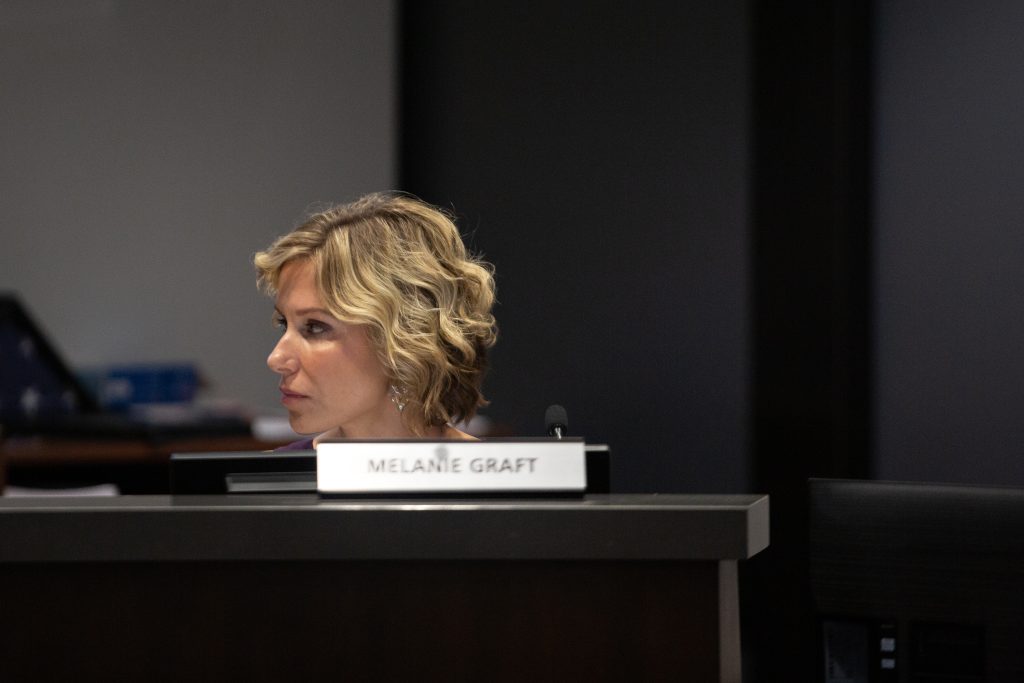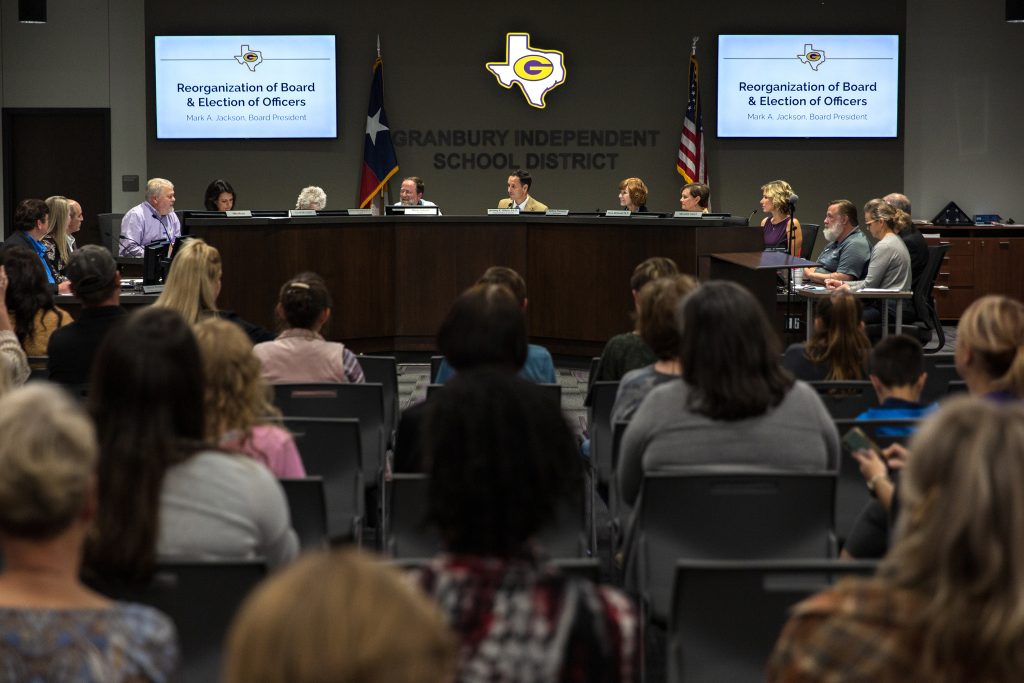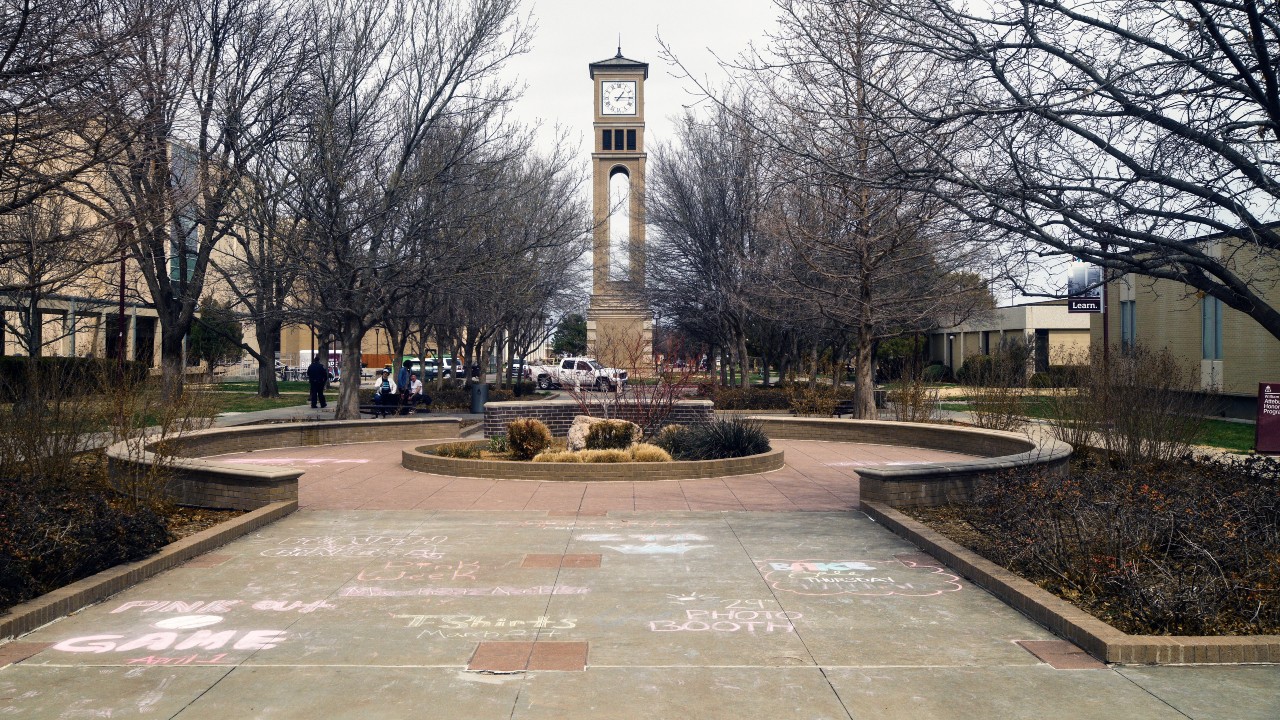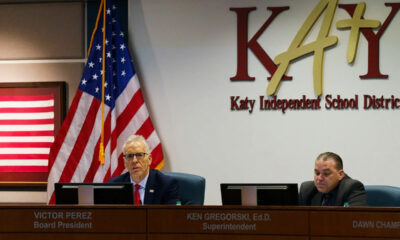Texas
A push to remove LGBTQ-themed books in a Texas county could signal rising partisanship on school boards
Hood County’s refusal to remove two books from the children’s section of the library sparked a yearslong political battle. Now school board races have taken on a deeply partisan tone, and elections serve as a purity test for far-right politics.

This article originally appeared in The Texas Tribune
 Nearly seven years ago, Melanie Graft’s 4-year-old daughter was in the children’s section of her local North Texas library when she picked up a book about an LGBTQ pride parade. Within the colorful pages of the book, “This Day in June,” children and adults celebrate with rainbow flags and signs promoting equality and love over hate. Adults embrace and kiss one another.
Nearly seven years ago, Melanie Graft’s 4-year-old daughter was in the children’s section of her local North Texas library when she picked up a book about an LGBTQ pride parade. Within the colorful pages of the book, “This Day in June,” children and adults celebrate with rainbow flags and signs promoting equality and love over hate. Adults embrace and kiss one another.
Alarmed, Graft launched a campaign against the book and another about a boy who likes to wear dresses, suggesting that their presence in the library foisted inappropriate themes on unsuspecting children. By June 2015, the Hood County Library Advisory Board had received more than 50 complaints asking that the two books be removed from the shelves of the children’s section. The board refused, saying the books did not promote homosexuality, as some complaints had suggested, and arguing that the library already required parents of young children to accompany them and check out materials. Librarian Courtney Kincaid called “This Day in June” a tool to teach respect and acceptance of the LGBTQ community, but she agreed to move it to the adult section. She kept “My Princess Boy” in the children’s section.
Opponents of the books then turned to the entirely Republican Hood County Commissioners Court, which appoints members to the library advisory board. After an emotional three-hour meeting that July, commissioners declined to remove the books on the advice of the county’s attorney, who concluded that such action could spur a lawsuit over unlawful censorship because of potential violations of state law and the U.S. Constitution.
Anger over that decision helped fuel a seven-year effort by far-right Christian conservatives in Hood County to seize control of elected offices and government boards from more traditional Republicans. They won spots on the commissioners court, grabbed seats on the library advisory board and, last year, launched a monthslong campaign to oust Michele Carew, the county’s independent elections administrator, accusing the Republican of harboring a secret liberal agenda.
In November, the group claimed a major victory after Graft won a seat on the school board in Granbury, the county seat. Also elected was Courtney Gore, the co-host of a local far-right internet talk show who has railed against masks and vaccines and promoted Donald Trump’s false claim that the 2020 presidential election was stolen. On the campaign trail, the women promised to comb through educational materials for any signs of “indoctrination” in the form of books or lesson plans that they charged promote LGBTQ ideology or what they referred to as critical race theory, a university-level academic discipline based on the idea that racism is embedded in U.S. legal and other structures.
“When my daughter was 4 years old, my parental rights were taken away here at the public library in Hood County,” Graft, who said on the campaign trail that her school-age children did not attend Granbury public schools, told attendees at a GOP forum before the election. “I stood up for my daughter then, and I’ll stick up for our kids now.”
The yearslong journey in Hood County offers a window into the fiercely contentious debates over curriculum and library books that have cropped up across the state and country in recent months. Once-nonpartisan school board races are taking on a decidedly partisan tone, and administrators are now sounding like political operatives.
Peter Coyl, a librarian who testified on behalf of the American Library Association in 2015 against removing the books, recalls thinking at the time that Hood County was an outlier because of how extensively the fight consumed the community. In retrospect, Coyl said, Hood County foreshadowed the larger battle that is playing out in school board races and over library books across the country.
“It was obvious that there was a portion of the community that was not happy with the outcome,” said Coyl, who now leads a library in Sacramento, California. “But I think now we are in an era, a time where people aren’t willing to have discourse or conversations about things. They want their way and they want to impose their view on anyone and everyone because they feel that they’re right.”
The Granbury Independent School District elections last fall served as a litmus test of loyalty to the GOP’s most conservative wing, which pushed candidates for nonpartisan posts to declare their party affiliation and to explain how they would actively push far-right initiatives.

“This was the first election where candidates felt the need to put ‘conservative’ or ‘Republican’ on their campaign signs and in their literature that they sent out,” said Nancy Alana, a self-described conservative Republican who lost to Gore in November after serving on the school board since 2009. “And I have always shied away from that because I understood that the school board position was nonpolitical. And that was what I was trying to uphold.”
A career educator who spent 30 years as a teacher and principal, Alana shares views similar to those of Graft and Gore on books and curriculum, but was pegged by some far-right Republican activists as too passive for their vision of a more uncompromising “new Granbury.” Alana said she worried that the focus on culture-war battles over books and curriculum could distract leaders from important issues like overcrowding in the growing district.
Graft did not respond to requests for comment. Gore said in an email to ProPublica and The Texas Tribune that declaring party affiliation makes school board elections more transparent. She said that the board “more accurately reflects the population now.”
“Any entity that taxes or oversees school curriculum is inherently partisan, whether people want to admit it or not,” Gore said. “I proudly ran as a Conservative Republican and will never apologize for being one.”
Challenges to books about sexual orientation and racial identity in Texas are the latest in a wave of divisive national political issues driving local campaigns. In October, Matt Krause, a Republican state representative from Fort Worth who was then running for attorney general, sparked national attention when he released a list of 850 books that he said should be investigated and potentially banned from school libraries. The majority of the titles dealt with LGBTQ themes, and some were targeted for merely including LGBTQ characters, according to an analysis by BookRiot.
Gov. Greg Abbott, facing a Republican primary challenge from two opponents running to his right on education issues, later ordered the Texas Education Agency to investigate the availability of “pornography” in public schools, a term that some politicians and district leaders have interpreted as a catchall for books on sexuality and sexual orientation. He urged criminal prosecutions under the state penal code of educators who make such material available.
At a January school board meeting, Granbury Superintendent Jeremy Glenn, who is appointed by the board, referenced Krause and Abbott in defense of the district’s recent decision to remove more than 130 books that deal with race and sexual orientation from school libraries, pending a review.
The Granbury school board went a step further during its meeting Jan. 24. Led by Graft, the school board cleared the way for the district to strip any material deemed vulgar or unsuitable by administration and the board from its shelves without a committee review.
The next night, at Brazos Covenant Ministries church, Glenn assured attendees at a Republican Party gathering that school board members would act as gatekeepers against books and “woke” curriculum about sexual orientation and racial identity.
Speaking in partisan political language not common among school superintendents, Glenn pointed to decreasing margins of victory for Republican presidential candidates in the state, and warned local party leaders that “there are individuals out there that want to destroy what you believe.”
“They don’t believe in the same America that you and I grew up in, and that’s just the truth,” he said. “Our community has to decide whether or not we want to hold the line.”

An old fight resurfaces
A week after the November election, Emily Schigut, a fifth grade reading teacher and soccer coach, put her house on the market. She knew it was time to leave her job.
Schigut, who has family in Hood County, was teaching in Midland five years ago when the principal of STEAM Academy at Mambrino in Granbury reached out to her about an opening at its campus.
She recalls her excitement at coming to the district, which she said was a model of innovation. Now she worries that politics have taken hold in a way that makes it difficult for teachers to do their jobs. And as someone who identifies as queer, she is concerned about the message the district is sending to educators and students.
“It’s absolutely terrifying,” Schigut said in an interview. “All anyone has to do is listen to the words they’ve said. They aren’t there for the kids. They are there for a political agenda. You watch all these things happening around the country, and in the blink of an eye, it was happening here.
“It’s very sad because I 100% believed in this district. But I do not feel safe here any longer.”
While the shift in tone at the school district felt sudden to Schigut, far-right Republicans had spent years working toward electing candidates to local political offices. Their efforts gained steam in the summer of 2015 amid outrage over two failed fights: one over the LGBTQ books and another when Hood County was required to comply with the U.S. Supreme Court’s landmark decision legalizing same-sex marriage. County Clerk Katie Lang initially refused to issue a marriage license to a gay couple.
Despite losing the debate over books, opponents claimed a major victory that year when Kincaid, Granbury’s librarian, resigned. She said she could no longer endure harassment and bullying by the group, which she recalled had posted someone at the library’s circulation desk every day to watch her.
“Even going out to lunch was a gamble because I didn’t know if my food would be tainted in any way by someone who disagreed with my decision to keep the books. Whenever I would leave the library, be it during my lunch time or running an errand for work, I was followed,” Kincaid told the American Library Association in 2017 after her resignation. Kincaid, who faced additional harassment following her departure from Hood County, declined an interview.
Graft became increasingly active in local politics, serving on the local library advisory board and as a Republican Party precinct chair. Her fight against the books made her popular in far-right circles, giving her a platform across the state.

During an interview with Doc Greene, a self-described conservative activist radio show host, at the 2016 state Republican convention in Dallas, Graft described the moment her daughter encountered “This Day in June” by Gayle Pitman.
“She picked it up, turned to the page and showed it to me, and I was appalled,” Graft said. “There were political issues. Signs like love over hate, equal rights, things that a child certainly can’t understand. And this book on the back binding was recommended for children ages 4 to 8.”
She continued, “They have an agenda and an indoctrination for our children. It’s not enough to tolerate. They want us to participate. And they want our children.”
After Graft had finished, Greene said he was not a violent man, then added, “But something like this enrages me to such a degree that violence is not completely ruled out. Because when you go after the children, this is not the time to just stand by and talk about it.”
Graft responded that she was not a proponent of violence, but Greene continued pressing.
“If you’re not willing to kill for what you believe, you’ve already lost the war. Our children are worth saving,” said Greene, who did not respond to requests for comment.
“I can’t argue with that,” Graft said. “I agree.”
A month later, the Northeast Tarrant Tea Party near the library where Kincaid had relocated uploaded a video of Graft speaking at one of its meetings to YouTube.
“This is Courtney Kincaid. You need to know her name,” Graft told the group as a screen flashed behind her. “We have to stand in the gap between the liberal left and our children. It only takes one liberal library with an agenda to steal the innocence of your child.”
Two years later, one of Graft’s allies in the fight against the books, Dave Eagle, a former Tea Party leader, was elected to the Hood County Commissioners Court. Eagle, who lost a bid for the school board in 2016, had vowed in a letter to the Hood County News the previous August that the Hood County Tea Party would “continue to reap political dividends” from the fights over same-sex marriage and LGBTQ books, as he complained about the local news organization’s coverage.
Eagle, who claimed credit for Kincaid’s departure, frequently sparred with members of the library’s advisory board and worked to change the makeup of the panel. In 2019, the Hood County Republican Party issued a formal resolution calling for the board to be disbanded, claiming that it failed to represent the “moral character” of the community. County commissioners dissolved the board last year after political divisions had made it difficult for the board to get much accomplished.
“It has become a lightning rod,” David Wells, the former library advisory board chair, said after the board disbanded. “It’s lost its sense of purpose, of what it’s there for. It’s way beyond the purpose for which it is designed.”
Eagle, who did not respond to a request for comment, also helped lead an effort last year that sought to abolish the elections administrator position held by Carew and transfer her duties to Lang, the county clerk, who has used social media to promote baseless allegations of widespread election fraud. Aside from saying that she would abide by the Constitution, Katie Lang has declined to discuss how she would approach elections management if given the role. Carew resigned in October. She is now running for office against Lang, an effort she said she undertook to prevent partisans from taking control of elections if commissioners decide to dissolve the independent election office.
Debates over national issues have left the ground fertile for takeovers in rural counties and small towns across Texas, provided local far-right activists can organize as they have in Hood County, said Brandon Rottinghaus, a professor of political science at the University of Houston.
“Local organizers can ride these national waves to power,” Rottinghaus said. “With the right spark, I think that’s a model they can replicate across the state.”
Pitman, the author of “This Day in June,” one of the children’s books targeted by Graft and Tea Party members in 2015, said the school board election in Hood County marks a worrisome escalation of rhetoric that previously seemed more isolated. “It just seems like there’s been a shift in the political climate,” Pitman said, adding that she never expected to see the massive wave of current book challenges.
“I think the most disturbing thing about this to me is that if you look historically at book challenges, for the most part, books were challenged because of the ideas that were in them,” Pitman said. “And that, to me, is really disturbing because it’s no longer about ideas or exchange of information or discourse, it’s about marginalizing an entire community.”

Reviewing 130 Books
In January, administrators in the Granbury school district summoned its librarians to a meeting to review library offerings “based upon the Governor’s criteria,” according to emails obtained by a Granbury parent through the Texas Public Information Act and shared with ProPublica and The Texas Tribune.
District officials immediately removed from the library shelves five books unrelated to LGBTQ themes by Abbi Glines, an author known for including explicit sex scenes that push the boundaries of young adult fiction. They also pulled about 130 other titles from school libraries, pending a review by a district committee composed of teachers, librarians and parents.
“Let’s not misrepresent things. We’re not taking Shakespeare or Hemingway off the shelves,” Glenn said at a school board meeting last week in which he blasted opponents of the book removal effort. “And we’re not going and grabbing every socially, culturally or religiously diverse book and pulling them. That’s absurd. And the people that are saying that are gaslighters, and it’s designed to incite division.”
Glenn made no mention of the dozens of LGBTQ-themed books that had been pulled from the shelves for further review. Of the 130 books temporarily removed, about 94, or 73%, feature LGBTQ characters or themes, according to a ProPublica and Tribune analysis of the popular book review site Goodreads.
Coyl said he is concerned that political candidates are increasingly using the issue of book censorship to win public office. “People need to be very vigilant and aware of it,” he said. “It’s a slippery slope. If we allow the restriction of one thing, it’s very easy to slide into more suppression.”
Experts say waves of backlash against LGBTQ communities often follow moments of cultural transformation. Schools have long been the battleground, dating at least to the 1970s, when anti-gay crusader Anita Bryant led a national movement to save children from gay adults.
But fed by social media, the same message today is spreading farther and faster than during past waves, experts said.

Vox Jo Hsu, an assistant professor of rhetoric and writing at the University of Texas at Austin who specializes in the effect of public rhetoric on racial, gender and sexual minorities, said movements to censor LGBTQ books can leave young people feeling alone.
“I can’t overstate the type of damage it does to create a culture of shame and silence around LGBTQ topics,” Hsu said. “You are teaching them, from a young age, these false narratives about who they are that they will have to unlearn and you’re depriving them of resources and communities they will need to do so.” Leaving a school district is not an option for all LGBTQ students or families, and children who are left behind when others depart will only become more isolated, Hsu said.
Last month, students in the Granbury district launched an online petition opposing the book removal effort. Within days, the petition had gathered more than 600 signatures. Students also spoke against the removal at last week’s school board meeting.
“I don’t think that little children should be shocked or disgusted by our identities,” a queer senior at Granbury High School said at the meeting, warning that removing the books would send a dangerous message. “It’s disgusting that, even in 2022, we still have to have these discussions about censorship.”
Glenn saluted the students for speaking out, but then took aim at those who questioned the removal of the books.
“During my tenure, I have witnessed radicals come into our boardroom and go onto social media platforms to distort the truth, exaggerate issues and bad-mouth our trustees,” Glenn said. “To those individuals, please know, like the little boys who cried wolf, you have lost all credibility to the majority in this community. We will not back down from you.”
In an email, Gore applauded the book removals and said the district is not taking aim at LGBTQ students or community members. “All students at GISD are loved and cared for by the amazing staff and administration,” she said. “With that, public schools are not the place for young people to express themselves sexually.”
Near the end of the discussion, Graft made a motion to amend the district’s policy on book removals, eliminating the requirement for campus-level committees that have determined whether concerns are merited.
The revised policy, which passed unanimously, will allow the district to remove books the administration and board deem “pervasively vulgar” or educationally unsuitable without going through the district’s existing process. Before the change, books had to stay on shelves until a review was completed.
“This is going to align the policy so that in the event that we do have a book that is in our library that is vulgar and overtly sexual, it can be removed without review,” said Tammy Clark, an assistant superintendent in the district.
Despite the policy change, district spokesperson Jeff Meador said a committee will review the books, and most of them “will likely be returned to the library shelves.”
Jonathan Friedman, the director of free expression and education at nonprofit PEN America, which promotes literary culture and defends freedom of speech, said the Supreme Court has not settled the constitutionality of removing school library books without a review. Still, he said it’s “highly concerning” that Hood County school board members “appear to have changed the policy just in order to appease the state lawmakers’ list of books.”
Friedman said that while there hasn’t been a recent legal challenge related to the spate of book removals, districts could find themselves in legal jeopardy if it becomes clear that their motive was based on “hostility towards the views in those books.”
Efforts to censor material usually fail, but the process can still be divisive and counterproductive, said Whitney Strub, a history professor at Rutgers University.
“I think history shows that these movements don’t actually succeed, but they do a lot of damage and inflict a lot of destruction and harm along the way,” Strub said. “And I absolutely think that’s likely to be the case at the local level.”

Seeking safety
The escalation of anti-LGBTQ rhetoric worries one Granbury mother of a 4-year-old, who asked that her name not be used as she fears retaliation because she is gay.
She recalled feeling reassured after county commissioners denied efforts to ban LGBTQ books from the local library in 2015 when she lived in a neighboring county. Although she didn’t have a child at the time, she believed that the books provided an opportunity to teach children that having gay parents is normal.
On election night in 2021, she was shocked when Graft, who had led the fight against the books, won. It was then that she and her wife decided to send their son, who is entering kindergarten, to another district. “It makes me worried that someone like her would tell kids that it’s not OK to be like that,” she said.
The woman can tick off the incidents of hate she has experienced since moving to the county four years ago: the stranger at the grocery store who called her a “faggot,” the senior citizen who threw his arms in the air in disgust and stormed off when he saw her kiss her fiancee goodbye.
She wanted school to be a safe space for her son, one that didn’t vilify him for having two moms.
“I wouldn’t put it past someone to physically harm me because I gave my fiancee a kiss,” she said. “Seeing stuff like the school board election definitely opens my eyes. Even though this is a small town, and I know most of the people, and I grew up next door, when it comes to sexuality nobody’s safe.”
Disclosure: The University of Houston and the University of Texas at Austin have been financial supporters of The Texas Tribune, a nonprofit, nonpartisan news organization that is funded in part by donations from members, foundations and corporate sponsors. Financial supporters play no role in the Tribune’s journalism. Find a complete list of them here.
The Texas Tribune is a nonpartisan, nonprofit media organization that informs Texans — and engages with them – about public policy, politics, government and statewide issues.
Education
Texas colleges launch course reviews amid push to limit gender identity instruction
After a viral video stirred controversy at Texas A&M, Texas Tech ordered course adjustments while other university systems like UNT and UT launched reviews. It’s unclear what the reviews will look for.

This article originally appeared in The Texas Tribune
 Last month, a viral video showing a Texas A&M University student confronting a professor over a discussion of gender identity during a children’s literature class sparked a firestorm in Texas higher education that has led other schools to review their academic offerings.
Last month, a viral video showing a Texas A&M University student confronting a professor over a discussion of gender identity during a children’s literature class sparked a firestorm in Texas higher education that has led other schools to review their academic offerings.
Texas A&M fired the professor in the video and former university President Mark A. Welsh III resigned. Seeking to preempt any similar controversy, the Texas Tech University System issued guidance last week instructing faculty to ensure that their courses comply with a federal executive order, a letter from Gov. Greg Abbott and a new state law that recognizes only two sexes.
Faculty and LGBTQ+ advocates fear the directive will limit classroom discussion of transgender and nonbinary identities. They warn the universities’ actions are the byproduct of political interference that threatens academic freedom and the quality of higher education in the state.
Brian Evans, president of the Texas Conference of the American Association of University Professors, said administrators should enable students to learn the widest set of topics by ensuring faculty can speak freely. He added that colleges and universities “have an obligation to develop campus policies that protect the Constitutional rights of their faculty to teach and research the subjects in their areas of expertise without intimidation or censorship.”
No law explicitly bars teaching topics like gender identity or the existence of more than two sexes. But Texas universities know their courses are under the microscope, with politicians and activists combing through catalogs and syllabi and demanding changes to any material they consider objectionable.
In the heels of Texas Tech’s guidance, at least three public university systems — the University of North Texas, the University of Texas and Texas Woman’s University — have ordered course reviews. They have framed the effort as ensuring compliance with state and federal law. But UT, UNT and TWU, unlike Texas Tech, did not specify which laws triggered the reviews. The systems did not say what actions their schools would take after the reviews.
Public universities are required to conduct curriculum reviews under Senate Bill 37, passed this year, but the first reviews aren’t due until 2027. The law directs governing boards to examine whether general education courses “are necessary to prepare students for civic and professional life” and “ensure a breadth of knowledge.” Earlier versions of the bill went much further, barring courses from promoting the superiority of any race, sex or religion, or from endorsing specific public policies or ideologies, but that language was cut before passage.
Here’s what public university systems and community colleges in the state have said so far:
Texas A&M University System
Chancellor Glenn Hegar announced on Sept. 9 a systemwide audit of course offerings, a day after Rep. Brian Harrison, R-Midlothian, posted a secretly recorded video of the children’s literature class.
The clip went viral, and within days, professor Melissa McCoul was fired, the dean of the College of Arts and Sciences and the head of the English Department were removed, and Welsh resigned under pressure from state leaders who said he had mishandled the controversy.
Hegar has not publicly detailed how the course review will be carried out or what criteria will be used.
Texas Tech University System
Chancellor Tedd Mitchell directed the presidents of the system’s five universities to review course materials, syllabi and curricula.
In a Sept. 25 letter, Mitchell told the university presidents to “make timely adjustments where needed” to comply with President Donald Trump’s Jan. 20 executive order, Gov. Greg Abbott’s Jan. 30 letter and House Bill 229, all of which recognize only two sexes, male and female. None of them directly requires or mentions restrictions on teaching.
“While recognizing the First Amendment rights of employees in their personal capacity, faculty must comply with these laws in the instruction of students, within the course and scope of their employment,” Mitchell wrote.
The order offered no details on how the reviews would be conducted, leaving faculty uncertain about what changes might follow and drawing criticism from free speech and LGBTQ+ advocates who called it censorship and accused it of being cruel to trans and nonbinary students.
Mitchell’s directive came after Angelo State University, part of the Texas Tech System, told faculty they could not discuss transgender and nonbinary identities in their classes, making it the first known public Texas university to restrict classroom acknowledgment of such gender identities.
University of North Texas System
On Sept. 29, Chancellor Michael Williams directed each UNT System institution to conduct an expedited review of its academic courses and programs, including a complete syllabi review, to ensure compliance with “all current applicable state and federal laws, executive orders, and court orders.” Campuses have until Jan. 1 to finish the reviews.
Although Williams’ letter did not mention Trump’s executive order, Abbott’s letter or House Bill 229 like Mitchell’s directive did, a UNT system spokesperson told The Texas Tribune they will be considered in the course reviews. But when asked whether the system believes those measures prohibit schools from teaching that there are more than two sexes, or what the reviews will specifically look for, the spokesperson said only that those questions “will be discussed in the reviews.”
University of Texas System
A UT System spokesperson told the Tribune that the system is reviewing “gender identity” courses across all campuses “to ensure compliance and alignment with applicable law and state and federal guidance, and to make sure any courses that are taught on UT campuses are aligned with the direction and priorities of the Board of Regents.” The review will be discussed at the regents’ November meeting, the spokesperson said.
The UT System did not cite any specific measures that had triggered the reviews. The spokesperson did not say whether the system was interpreting and applying the president’s executive order, the governor’s letter or House Bill 229 in the same way as Texas Tech did.
The UT System also did not clarify what “reviewing gender identity courses” means in practice or whether it intends to prohibit or alter such classes.
University of Houston System
The system did not respond Tuesday to the Tribune’s request for comment.
Texas State University System
The system did not respond Tuesday to the Tribune’s request for comment.
Texas Woman’s University System
Texas Woman’s University System is “in the process of establishing a review of academic courses and programs, in accordance with all applicable state and federal laws,”a spokesperson said. The system, which is the state’s newest and smallest with campuses in Denton, Dallas and Houston, did not specify what the review will look for or whether it could result in changes to courses or programs.
Community colleges
In the Houston area, San Jacinto College “has made faculty and staff aware” of Trump’s executive order, Gov. Abbott’s letter and House Bill 229, according to Amanda Fenwick, a spokesperson for the college. Faculty have been instructed to do a review of course content, she said.
“San Jacinto College is committed to understanding and following federal and state laws and ensuring that all employees — including faculty — are compliant,” Fenwick wrote in a statement to the Tribune.
As part of the review, faculty have been ordered to ensure course content is aligned with student growth goals, which are in the Texas Higher Education Coordinating Board’s Academic Course Guide Manual and Workforce Education Course Manual, Fenwick said.
Texas has 50 community colleges. It is unclear if any other school is planning to review their courses. The Tribune also reached out to Alvin Community College and Blinn College, but they have not responded.
Sneha Dey contributed to this story.
The Texas Tribune partners with Open Campus on higher education coverage.
Disclosure: Texas Tech University System and University of North Texas have been financial supporters of The Texas Tribune, a nonprofit, nonpartisan news organization that is funded in part by donations from members, foundations and corporate sponsors. Financial supporters play no role in the Tribune’s journalism. Find a complete list of them here.
The Texas Tribune is a nonpartisan, nonprofit media organization that informs Texans — and engages with them – about public policy, politics, government and statewide issues.
Education
Feds investigate another Texas school district for its gender identity mandate
Katy ISD’s board voted this past fall to require staff to notify parents if their child wants to use a different pronoun or identifies as a different gender.

This article originally appeared in The Texas Tribune
 The U.S. Department of Education’s Office for Civil Rights opened an investigation Monday into Katy Independent School District’s gender identity policy on the basis of gender harassment under Title IX. The investigation came nine months after the Houston Landing reported that the district adopted a policy that notifies parents if their child requests to use a different name or pronouns at school.
The U.S. Department of Education’s Office for Civil Rights opened an investigation Monday into Katy Independent School District’s gender identity policy on the basis of gender harassment under Title IX. The investigation came nine months after the Houston Landing reported that the district adopted a policy that notifies parents if their child requests to use a different name or pronouns at school.
Katy ISD did not respond to a request of how many parents have been notified this year under the new policy, which requires staff to inform parents that students are transgender or ask to use different names or pronouns.
The Houston Chronicle reported in December that the district had notified parents at least 23 times since the policy was adopted.
The gender identity policy also bars schools from teaching “gender fluidity” and denies students from competing in sports with the gender they identify with, which mirrors state legislation already regulating K-12 athletics.
Students Engaged in Advancing Texas, a student-led advocacy group, filed a complaint with the U.S. Department of Education in November regarding the policy. Katy ISD graduate and member of SEAT Cameron Samuels labels the investigation as a win against the conservative policies being passed in the district.
“Elected solely on platforms to target marginalized students, far-right school board candidates accomplished exactly what they were elected to do: weaponize identity and neglect students’ educational needs,” they said.
Title IX prohibits sex-based discrimination in educational settings or federally funded activities. Gov. Greg Abbott has loudly voiced his opposition to the federal law recently ordering the Texas Education Agency to disregard the Biden administration’s expansion of Title IX.
“The district is committed to offering equal educational opportunities to our entire community,” a spokesperson from Katy ISD told the Tribune in a response to the investigation. “While we have received the OCR filing and deny any wrongdoing, we are committed to remaining fully cooperative and responsive throughout the process.”
Victor Perez, Katy ISD board president and proponent of the policy, argued that the policy was “mischaracterized” by community members as an attack on its queer and transgender students and instead relieves the burden for staff withholding information from parents. The policy was passed at a board meeting in August with a vote of 4-3 after four hours of public comment.
Alastair Parker, a member of the Cinco Ranch High School Gender-Sexuality Alliance, spoke at the board meeting in opposition to the policy.
Parker and others argued that the policy infringes on the rights of transgender kids to express themselves and opens them to potential harm if they are outed to transphobic parents or caregivers.
Johnathan Gooch from Equality Texas, a nonprofit advocacy group for LGBTQ+ Texans, said he hopes students recognize their power to report policies like this in the wake of the increasing number of legislation targeting LGBTQ+ youth.
This isn’t the first instance in Texas of a gender related policy being investigated on the federal level. Carroll ISD in Tarrant County was reported to have eight open investigations last February after it eliminated protections over race, religion, gender and sexual orientation.
There are documented mental health benefits to using preferred pronouns. A research team at the University Texas at Austin conducted a study in which they concluded that students in gender-affirming environments report 71% fewer symptoms of severe depression, a 34% decrease in reported suicidal ideation and a 65% decrease in suicide attempts.
“When students place their trust in teachers and school administration, the school has a duty to preserve that trust,” Gooch said. “That duty requires schools to ensure that no disclosure would place a student in harm’s way.”
Parker has been out as a transgender man since the seventh grade and is supported by his father, who he resides with. He acknowledged that this isn’t the case for many of his classmates as some have parents that are less accepting.
His teachers have gone by his preferred name and pronouns for his entire high school experience. But since the policy has been enacted, he has seen some of his peers go by their deadnames fearing that their parents would be notified.
Over the past year, other schools across the state have adopted similar policies.
Keller ISD, which is also in Tarrant County, passed a policy in late June that prevents students from using their preferred name and pronouns or using restrooms with the gender they identify with.
The policy was met with retaliation from the Texas American Civil Liberties Union, writing in a letter to the district that the policy is “deeply invasive and unlawful for school administrators to interrogate students’ private medical information in this way.”
As the end of the school year nears, Parker observed the policy being enforced at varying levels of severity by teachers. The passing of legislation or policy like this deters from the ongoing health crisis for queer and transgender youth and is wholly unnecessary, he said.
“If a child’s not telling their parents something like that, it’s for a reason,” he said. “I know that most of the people who are in favor of this are the ones who bounce off whatever their parents have told them to repeat.”
Disclosure: Equality Texas has been a financial supporter of The Texas Tribune, a nonprofit, nonpartisan news organization that is funded in part by donations from members, foundations and corporate sponsors. Financial supporters play no role in the Tribune’s journalism. Find a complete list of them here.
The Texas Tribune is a nonpartisan, nonprofit media organization that informs Texans — and engages with them – about public policy, politics, government and statewide issues.
Amarillo
Appeals court considers whether West Texas A&M drag show was unconstitutionally banned
University President Walter Wendler canceled a drag performance last year, claiming such shows “denigrate and demean women.”

This article originally appeared in The Texas Tribune
 A federal appeals court considering whether West Texas A&M University’s president violated the First Amendment when he canceled a campus drag show last year focused many of their questions Monday on a U.S. Supreme Court ruling that upheld campus non-discrimination policies.
A federal appeals court considering whether West Texas A&M University’s president violated the First Amendment when he canceled a campus drag show last year focused many of their questions Monday on a U.S. Supreme Court ruling that upheld campus non-discrimination policies.
But the panel of three judges used that 2010 case — which said universities can require groups to admit LGBTQ+ students — to suggest that school officials could also ban drag shows because some people find the performances offensive to women.
A lawyer representing a group of West Texas A&M students who’ve twice attempted to host a drag show on campus argued before the 5th U.S. Circuit Court of Appeals Monday that President Walter Wendler discriminated based on viewpoint and censored speech when canceling the performances.
In March 2023, Wendler banned drag shows in response to a student fundraiser that featured drag performers. The president argued the performances “denigrate and demean women,” and shouldn’t be allowed on the public university’s campus.
In September, a federal judge said Wendler acted within his authority to cancel the drag show. In his opinion, U.S. District Judge Matthew Kacsmaryk wrote, at “this point in Free Speech jurisprudence, it is not clearly established that all ‘drag shows’ are categorically ‘expressive conduct.’”
Last month, students with WT Spectrum, the student group at the university, hoped to hold another drag show on campus — to show support for the LGBTQ+ community in a staunchly conservative corner of Texas.
With Wendler’s campus-wide ban still in place, the Supreme Court declined to intervene and the president again ordered the fundraiser from taking place.
The panel of judges hearing the appeal Monday were James Dennis, James Ho and Leslie Southwick.
Many of their questions centered around Christian Legal Society v. Martinez, a case in which the Supreme Court upheld a policy of the University of California, Hastings College of the Law, that bars student groups from excluding members based on status or beliefs.
In 2010, the Supreme Court affirmed that Hastings’ policy does not violate the First Amendment rights of CLS, a group of students that wanted to be officially recognized on campus while not allowing people who engage in “unrepentant homosexual conduct” from joining.
The 5th Circuit judges Monday seemed to suggest that Wendler’s ban was no different from the policy at the center of the 2010 Supreme Court case. One of the judges, who didn’t identify themselves before speaking, asked if plaintiffs intended to use the case in question to overturn CLS.
“Maybe we should overturn CLS?” one of three judges said. “Many people would like CLS overturned.”
Ho equated the policy upheld in CLS with Wendler’s drag ban. He said both intend to make everyone feel included, but the policies have the consequence of targeting one group. In CLS’ case, he said that Christians were singled out on Hastings’ campus for not allowing LGBTQ+ individuals to join. Ho said that previous groups on Hastings’ campus could exclude members, but CLS was singled out by the university’s non-discrimination policy.
JT Morris, senior attorney for the Foundation for Individual Rights and Expression who represented the students, argued that the judges were comparing “apples to oranges” between the two cases.
Morris argued CLS is about a content-neutral policy, while Wendler was clearly discriminating based on viewpoint.
“The First Amendment does not allow the government to use the subjective term ‘offensive’ to restrict speech,” Morris said.
Joseph N. Mazzara, a lawyer with the Texas Attorney General’s Office who represented Wendler, said the students had not suffered any injury as a result of the no-drag policy because there was no future event featuring drag performers planned. Additionally, Mazzara said Wendler’s policy carried no criminal penalties and students could host drag performances off campus.
Mazzara said Wendler’s ban was not a free speech violation, but rather it was akin to banning certain conduct, like skateboarding on the grounds of a monument. He said drag shows constituted conduct, not speech.
“They’re able to do everything they want to do, they’re able to say all the speech they want to [say],” Mazzara said, referring to the student group WT Spectrum. “They just can’t do this one particular thing in this one particular place.”
A judge asked Mazzara how the university would have treated drag shows put on by other student groups, such as a fraternity. The judges seemed to agree with Mazzara that Wendler’s restriction did not target a specific viewpoint.
“If a Christian legal group wanted to have a ‘Drag for Jesus’ event that would also be banned,” Mazzara said.
One judge suggested that some drag shows are offensive to the transgender community, and thus Wendler’s ban would equally protect that population from offensive performances.
Allison Marie Collins, another lawyer from the Attorney General’s Office representing other defendants named in the lawsuit, argued the appellate judges should not impose any restrictions on Texas A&M system Chancellor John Sharp or West Texas A&M Vice President for Student Affairs Christopher Thomas. She argued an injunction against Sharp or Thomas would be overbroad, because it’s clear that only Wendler has acted to stop these shows.
“Neither Chancellor Sharp nor Dr. Thomas have remotely engaged in viewpoint discrimination, exclusion from a public forum or a prior restraint complaint to speech,” Collins said.
In his rebuttal, Morris argued the plaintiffs have standing over Sharp because he has the authority over Wendler to put an end to this restriction on free speech.
“He has the authority to do what’s best for the campus,” Morris said of Sharp. “He should have put an end to this prior restraint, which shouldn’t have lasted a day, and has now lasted a year.”
Disclosure: Texas A&M University and West Texas A&M University have been financial supporters of The Texas Tribune, a nonprofit, nonpartisan news organization that is funded in part by donations from members, foundations and corporate sponsors. Financial supporters play no role in the Tribune’s journalism. Find a complete list of them here.
The Texas Tribune is a nonpartisan, nonprofit media organization that informs Texans — and engages with them – about public policy, politics, government and statewide issues.














